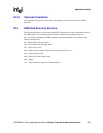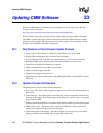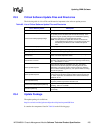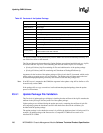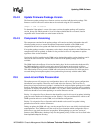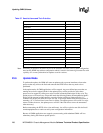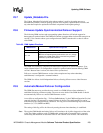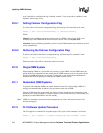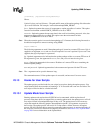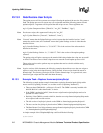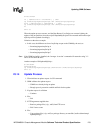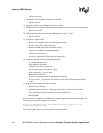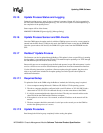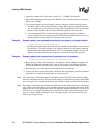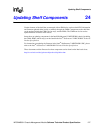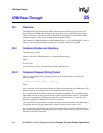
MPCMM0001 Chassis Management Module Software Technical Product Specification 211
Updating CMM Software
[overwrite] [ftp:server:user:password]”
Where:
Update Package path and filename - The path and file name of the update package file without the
.zip or .md5 extension. For example: “usr/local/cmm/temp/CMM_P00.09f”
force - Optional argument that causes all components to update regardless of version. This option
cause the environment variable FORCE_UPDATE to be set to TRUE.
overwrite - Optional argument that prevents data in the saveList from being preserved. Also, data
restore user scripts will not be executed. This option cause the environment variable
FORCE_OVERWRITE to be set to TRUE.
Note: When the overwrite option is not used when updating to 5.2 firmware, the following line needs to
be added to /etc/profile to remove warnings using SNMP:
export MIBS=""
The following arguments are used if the update package is located on a remote FTP server. If ftp is
supplied as an argument, server and user are also required. Password is optional. If password is not
supplied, then ftp will prompt for a password.
ftp - Optional argument used to indicate that the update package resides on a remote FTP server. If
this argument is given, the arguments for server, user, and password must also be given.
server - Optional argument that is the name or IP address of a remote FTP server containing the
firmware update package.
user and password - Optional argument that is the username and password for the FTP server.
Note: The -v argument can be up to 64 characters long.
The command returns a 0 if the update request is successful, and non-zero if an error occurs.
23.13 Hooks for User Scripts
The update process provides hooks for user scripts in two places during the update process. User
scripts should follow the convention of returning a "0" if successful and a non-zero for failure. The
user scripts will be invoked as a forked sub-shell.
23.13.1 Update Mode User Scripts
Entering update mode requires that all JFFS2 drives be unmounted, which requires that all
processes using these drives be stopped. Prior to entering update mode, the update process will call
user scripts located in /home/update/scripts/ if they exist. The update process will execute any
scripts that match the following pattern: /home/update/scripts/K*. No arguments are passed to
these scripts. The update process will not fail if a script returns a failure, however, the update
process will fail if the flash drives can not be unmounted when necessary. A message indicating if
the script was successful or failed will be output to the terminal. See Section 23.6, “Update Mode”
on page 208 for more information on the Update Mode.



